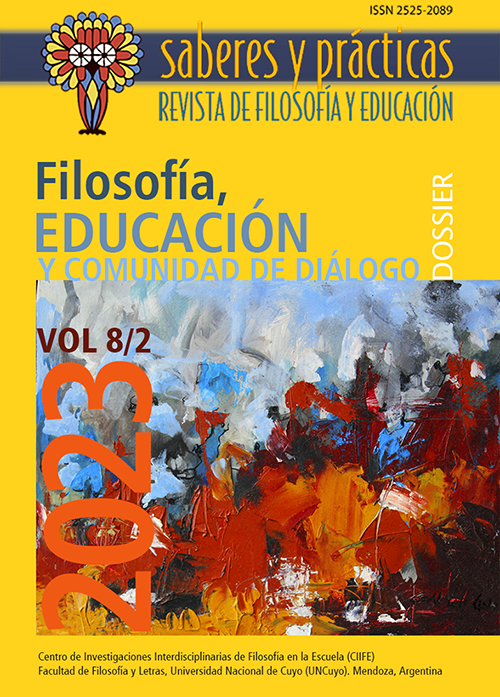The pedagogy-coloniality relationship
We are not visible where we can be found, but where we feel we live
DOI:
https://doi.org/10.48162/rev.36.112Keywords:
Living pedagogy, coloniality, primary schoolAbstract
From a philosophical-educational perspective, this article addresses the pedagogy-coloniality relationship and its effects on the school. From the analysis of these elements, their coexistence and tension, a living pedagogy that enables the school to be inhabited from and for a practice that delegitimises colonial school forms is recognised. This paper is based on an investigation conducted in two public primary schools in southern Mendoza (2019-2022) using the methods of community of dialogue and community of enquiry. It sought to explore the link between the modern colonial-Eurocentric educational project and the ways of inhabiting the school, based on the assumption that such a relationship limited the construction of worldviews, life projects and contextualised social community ties,holding as valid reduced options for life and social survival. The link implied noticing the school elements present and absent involved, those present in a hegemonic way, imposed by the modern rationality, and those absent, made invisible or not evident from this logic. In the tensions between presence and absence made visible in the study, the pedagogy-coloniality relationship emerges. In order to approach it, it is first unfolded the construction of a theoretical framework that thinks about colonial marks through Aníbal Quijano, the possibility of a critical pedagogy through Paulo Freire and its contradictions in modernity. Secondly, this characterisation is expanded considering the idea of living pedagogy and what it calls for. Finally, it reflects on living pedagogy as a project that recovers social-community ties broken by the modern school project.
Downloads
References
Freire, Paulo (1985). Pedagogía del Oprimido. Siglo XXI Editores.
Kohan, Walter (2022). Paulo Freire: Um menino de 100 anos. NEFI: Edições
Kohan, Walter y Olarieta, Fabiana (Coord.). (2013). La escuela pública apuesta al pensamiento. Homo Sapiens Ediciones.
Larrosa, Jorge. (2009) Experiencia y alteridad en educación. Presentación. En: Skliar, Carlos y Larrosa, Jorge. (Org.) Experiencia y alteridad en educación. pp. 13-44. Homo Sapiens Ediciones.
Larrosa, Jorge (2003). La experiencia de la lectura. Estudios sobre literatura y formación. Fondo de la Cultura Económica.
Larrosa, Jorge (2010). Herido de realidad y en busca de la realidad. Notas sobre los lenguajes de la experiencia. En: Contreras Domingo, José y Pérez de Lara, Nuria (Eds.) Investigar la experiencia educativa. pp. 87-116. Ed. Morata.
Larrosa, Jorge (2017). Pedagogía profana. Estudios sobre el lenguaje, subjetividad y educación. Miño y Dávila Editores.
Larrosa, Jorge con Rechia, Karen (2018). P de Profesor. Ed. Noveduc.
Quijano, Aníbal (2014a) Colonialidad del poder, eurocentrismo y América Latina. En: Lander, Edgardo (Comp.). La colonialidad del saber: eurocentrismo y ciencias sociales. Perspectivas Latinoamericanas. pp. 777-832. Ed. Clacso. http://biblioteca.clacso.edu.ar/clacso/se/20140507042402/eje3-8.pdf
Quijano, Aníbal (2014b) Colonialidad del Poder y clasificación social. En: Castro Gómez, Santiago y Grosfoguel, Ramon (Comp.) (2007) El giro decolonial: reflexiones para una diversidad epistémica más allá del capitalismo global. pp. 285-327. Ed. Siglo del Hombre. http://biblioteca.clacso.edu.ar/clacso/se/20140506032333/eje1-7.pdf
Quiróz, María Milena (2023) El día a día y lo imponderable. Formas pedagógicas contracoloniales en escuelas primarias del sur de Mendoza [Tesis de doctorado publicada en el repositorio UNCUYO]. Facultad de Filosofía y Letras. Universidad Nacional de Cuyo.
Segato Rita (2018a). La crítica de la colonialidad en ocho ensayos. Y una antropología por demanda. Ed. Prometeo Libros.
Segato Rita (2018b). Contra-Pedagogías de la crueldad. Ed. Prometeo Libros.
Skliar, Carlos. [Carlos Skliar]. (24 de mayo de 2021). Buenas tardes, muchas gracias por estar aquí, por acompañarnos, y haber aceptado esta humilde invitación a nada más y nada menos que una lectura. Proponerles una lectura juntos. [Video]Facebook.https://www.facebook.com/paginacarlosskliar/videos/4144575755635719
Published
How to Cite
Issue
Section
License
Copyright (c) 2023 Milena Quiroz
This work is licensed under a Creative Commons Attribution-NonCommercial-ShareAlike 2.5 Argentina License.





















